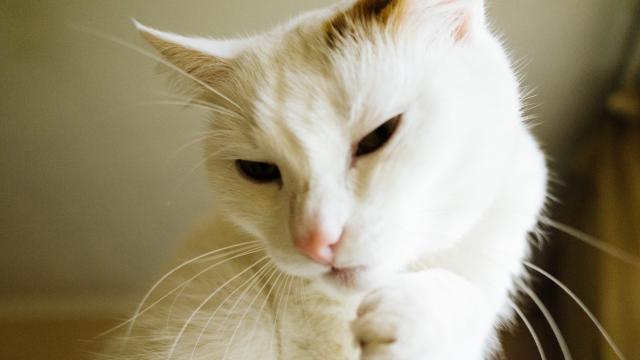People unjustly kept away from feline companionship due to an allergy are rejoicing this week, after news resurfaced of a potential vaccine that makes cats less able to cause allergies. But while this research is promising, a finished product won’t be available any time soon.
The vaccine in question is being developed by Swiss-based Hypocat and is the company’s lead experimental and namesake drug. This April, Hypocat published results from a study on the vaccine. And it’s this news that the internet has, for reasons lost to the void, started to buzz about again.
The study, published in the Journal of Allergy and Clinical Immunology, details a very clever strategy to tackle cat allergies.
The vaccine doesn’t try to desensitise the immune system of people allergic to cats, as other existing immunotherapies like allergy shots do. Rather, it attempts to train the immune system of cats to go after a specific protein, or allergen, that they naturally produce called Fel d 1. It’s supposed to accomplish this trick by hitching a genetically modified version of the protein to a virus-like particle derived from a plant virus (only being a particle, it shouldn’t be capable of causing disease).
Some 90 per cent of people with a cat allergy produce antibodies to Fel d 1. So if successful, the vaccine would basically turn cats hypoallergenic by greatly reducing the amount of Fel d 1 they make and eventually spew into our noses and mouths.
In the study, that’s what the vaccine seemed to do. Across various experiments, more than 50 young cats were dosed with the vaccine, administered via a shot to their hind legs. In the latest experiment, cats were given three doses over nine weeks; some cats also got a booster shot six months later.
All the cats, they reported, developed a sustained immune response to the allergen, and the booster shot helped keep antibody levels high. Antibodies taken from the cats’ blood also seemed to neutralise Fel d 1 in the lab, while the cats themselves produced less Fel d 1 in their saliva and tears. And when these cat samples were mixed with blood taken from real human patients with a cat allergy, they caused less of an allergic reaction.
Most importantly for animal lovers, the vaccine didn’t appear to cause serious or long-term side effects in the cats. One likely reason for this is that Fel d 1 doesn’t have a crucial function in cats, as far as we know. Some cats are already naturally very low in Fel d 1, without any apparent health problems. The vaccine also doesn’t completely eliminate the protein.
This is exciting news, but it’s also very early, “pre-clinical” data. The company has said that it’s been in discussions with both U.S. and European drug approval agencies and that it’s started to lay down the groundwork for mass production and clinical trials involving people.
But even if these trials started today and the vaccine passed them with flying colours, you’ll still have to wait years before it could hit the market. A similar vaccine for dogs in development by the company, called Hypodog, is even further back in the pipeline.
So by all means, go ahead and get giddy about someday owning a pet that won’t turn you into a sniffly mess. Just know you’ll have to be patient for a while longer.
